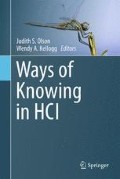Abstract
The expansion of human–computer interaction (HCI) to every aspect of human activity creates new challenges to the core ethical mandates of doing no harm, maintaining respect for people who participate in our studies, and weighing the costs and benefits of research, making sure that they are distributed fairly over the population. Online research adds further complications. This chapter reviews the ethical challenges and helps researchers prepare their cases for the Institutional Review Board (IRB) approval.
Access this chapter
Tax calculation will be finalised at checkout
Purchases are for personal use only
Notes
- 1.
IRB members employed by state institutions may be protected by the doctrine of sovereign immunity. Exact laws vary by state. See Bordas (1984) for a detailed discussion.
References
(1949). Trials of war criminals before the nuremberg military tribunals under Control Council Law No. 10. Retrieved June 13, 2012 from http://www.hhs.gov/ohrp/archive/nurcode.html
ACM (1992). ACM code of ethics and professional conduct. Retrieved Jue 13, 2012 from http://www.acm.org/about/code-of-ethics
Bardzell, S. & Bardzell J. (2011). Towards a feminist HCI methodology: Social science, feminism, and HCI. Proceedings of CHI (pp. 675–684). Vancouver, BC, Canada: ACM
Bederson, B. & Quinn A. (2011). Web workers unite! addressing challenges of online laborers. Proceedings of alt.CHI. Vancouver, BC, Canada: ACM
Belmont. (1979). The belmont report. Washington, DC: US Department of Health, Education, and Welfare.
Berry, D. M. (2004). Internet research: Privacy, ethics and alienation—An open source approach. Internet Research, 14(4), 323–332.
Bordas, L. (1984). Tort Liability of Institutional Review Boards. West Virginia Law Review, 87(1), 137–164.
Borning, A. & Muller M. (2012). Next steps for value sensitive design. Proceedings of CHI (pp. 1125–1134). Austin, TX: ACM
Bruckman, A. (2002). Studying the amateur artist: A perspective on disguising data collected in human subjects research on the internet. Ethics and Information Technology, 4(3), 217–231.
Bruckman, A. (2012). Interviewing members of online communities: A practical guide to recruiting participants. In A. Hollingshead & M. S. Poole (Eds.), Research methods for studying groups and teams (pp. 199–210). New York: Routledge.
CDC (2011). The Tuskegee Timeline. Retrieved October 31, 2012 from http://www.cdc.gov/tuskegee/timeline.htm
Ehn, P. (2008). Participation in design things. Partcipatory Design Conference (pp. 92–101). Indianapolis, IN: ACM
Ess, C. (2002). Internet research ethics. Ethics and Information Technology, 4(3), 177–188.
Ess, C. & T. A. E. W. Committee (2002). Ethical decision-making and internet research, Association of Internet Researchers. 33
Friedman, B. (1996). Value-Sensitive Design. ACM Interactions, 3, 17–23.
Friedman, B., & Kahn, P. H. (2006). Value-sensitive design and information systems. In P. Z. Dennis Galletta (Ed.), Human-computer interaction and management information systems: Applications (pp. 348–372). New York: ME Sharpe.
Gilbert, E., Karahalios, K., et al. (2008). The network in the garden. Proceedings of CHI. ACM
Hayes, G. R. & Abowd G. (2006). Tensions in designing capture technologies for an evidence-based care community. Proceedings of CHI (pp. 937–946). Montreal, Quebec, Canada: ACM
Hayes, G. R., Kientz, J. et al. (2004). Designing capture applications to support the education of children with autism. Proceedings of UbiComp. Tokyo, Japan: ACM
Herring, S. (1996). LInguistic and critical analysis of computer-mediated communication: Some ethical and scholarly considerations. The Information Society, 12, 153–168.
Hofmann, J. (1999). Writers, texts, and writing acts: Gendered user images in word processing software. In D. MacKenzie & J. Wajcman (Eds.), The social shaping of technology. New York: Open University Press.
Hudson, J. M., & Bruckman, A. (2004). “Go Away”: Participant objectiions to being studied. The Information Society, 20(2), 127–139.
IEEE (2012). Software engineering code of ethics and professional practice. Retrieved June 13, 2012 from http://www.computer.org/portal/web/certification/resources/code_of_ethics
Kant, I. (1964). Groundwork for the metaphysic of morals. New York: Harper & Row.
Kraut, R. (2012). Personal communication to A. Munich, Germany: Bruckmann.
Kraut, R., Olson, J., et al. (2004). Psychological research online: Report of Board of Scientific Affairs’ Advisory Group on the Conduct of Research on the Internet. American Psychologist, 59(4), 1–13.
LeDantec, C. A. & Edwards, W. K. (2008). Designs on dignity: Perceptions of technology among the homeless. Proceedings of CHI (pp. 627–636). Florence, Italy: ACM
Mamykina, L. & Mynatt, E. (2007). Proceedings of Healthnet (pp. 49–54). San Juan, Puerto Rico: ACM
Manier, J. (1999). UIC suspended from doing most human research. Chicago, IL, Tribune Company: Chicago Tribune.
Nisbett, R. (2012). Personal communication to A. Munich, Germany: Bruckmann.
OHRP (2001). US Code of Federal Regulations Title 45 Part 46, Protection of Human Subjects. United States Federal Code. Retrieved June 15, 2012 from http://ohrp.osophs.dhhs.gov/humansubjects/guidance/45cfr46.htm
OHRP (2012). Compliance oversight, determination letters. From http://www.hhs.gov/ohrp/compliance/letters/index.html
Rosaldo, R. (1993). Culture and truth: The remaking of social analysis. Boston, MA: Beacon.
Seidman, I. (2006). Interviewing as qualitative research. New York: Teachers College Press.
Silberman, M. S., Ross, J. et al. (2010). Sellers' problems in human computation markets. Proceedings of KDD-HCOMP (pp. 18–21). Washington, DC: ACM
UNLV (2012). History of research ethics. Retrieved June 13, 2012 from http://research.unlv.edu/ORI-HSR/history-ethics.html
Weiss, R. (1999). US halts human research at duke. Washington, DC: The Washington Post.
Author information
Authors and Affiliations
Corresponding author
Editor information
Editors and Affiliations
Rights and permissions
Copyright information
© 2014 Springer Science+Business Media New York
About this chapter
Cite this chapter
Bruckman, A. (2014). Research Ethics and HCI. In: Olson, J., Kellogg, W. (eds) Ways of Knowing in HCI. Springer, New York, NY. https://doi.org/10.1007/978-1-4939-0378-8_18
Download citation
DOI: https://doi.org/10.1007/978-1-4939-0378-8_18
Published:
Publisher Name: Springer, New York, NY
Print ISBN: 978-1-4939-0377-1
Online ISBN: 978-1-4939-0378-8
eBook Packages: Computer ScienceComputer Science (R0)

